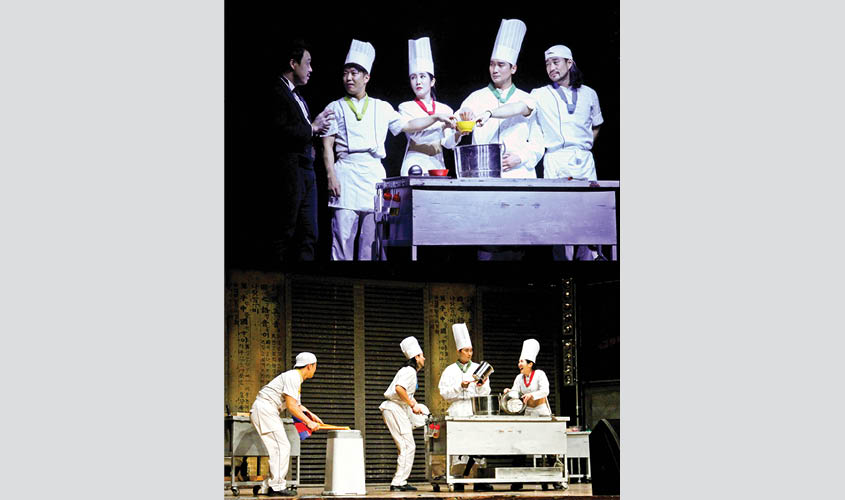What happens when you have a typical kitchen crew performing a non-verbal musical comedy using mundane cookery and cleaning items? Interesting episodes unfold on the stage. This is the foundation of Korea’s famous show, Cookin’ Nanta, a percussion performance which showcases the goings-on in a kitchen in a comical manner. But it is not a regular physical comedy or musical. It’s highly creative, dynamic and engaging.
On 13 November, a team of five South Korean artistes performed the show, once in the afternoon and once in the evening, at Delhi’s Siri Fort Auditorium. The event was organised by the Korean Cultural Centre India, Embassy of the Republic of Korea, in collaboration with the Korea Foundation. The event was attended by H.E. Shin Bongkil, Ambassador of the Republic of Korea to India; and Kim Kum Pyoung, Director, Korean Cultural Center, in addition to more than 2,000 people.
While the troupe has performed shortened versions of the act in India before, this was the first time they were performing the entire 90-minute show. About this initiative, Kim Kum Pyoung, Director, Korean Cultural Center, said, “This year is the 45-year anniversary of diplomatic ties between India and Korea. To celebrate this friendship, we wanted to showcase the authentic Nanta performance here.”
Delhi was the fourth city to host the show in India, after Hyderabad, Vijaywada and Chennai. The fifth and final venue for the troupe’s India tour is Mumbai, where they’re slated to perform on 20 and 21 November.
Ju Nwo Park, the crew manager of the show stressed that through Cookin’ Nanta, they are trying to showcase Korean culture, using cooking as their principal theme.
The story of the play involves five members—a manager, his nephew who is a troublemaker, and three chefs. The show opens with a scene where chefs are seen going about their regular work. Next, the manager rushes into the kitchen ordering them to prepare food for a wedding party.
What we see after that is a series of action, rhythm and dance produced using kitchen tables, cutting boards, knives, vegetables, utensils and containers. The transformation of these items as musical instruments as part of the synchronised act is truly marvelous.
After some time, the manager brings his nephew on board and asks the chefs to teach him cooking. So with just one hour to go before the wedding which they’re preparing a meal for, the hustle continues. The play manages to comically portray what goes on in kitchens—chefs goofing around, picking on the new guy, the overbearing manager giving deadlines, chefs sneaking in some romantic moments etc.—all in a comic way. Amid sliding tables and flying vegetables, the artistes truly hold the attention of the audiences.
The artistes rehearsed for at least six months to perfect their performance. According to the actors, every detail of the show is challenging. Hwang Yohan, who plays the restaurant manager informed us that a lot of emphasis is on expressions. “Because this is a non-verbal performance, we stress more on facial expressions and how we deliver the idea to the audience. This requires a lot of practice,” he said. Routine practice is needed to achieve proficiency, especially in actions involving knives, fires and sticks, which could result in injuries.
Even though it’s primarily a non-verbal show, the artistes incorporated some phrases of Hindi as part of the act to make it more appealing for the Indian audiences. About adding the local touch, Hye Jin Yun, the woman who plays the hot sous chef, said, “It’s a great pleasure for us to entertain the audience and communicate with them in their own language.” Even though the show is script-based, the actors improvise on stage. The percussion set is what can’t be anticipated. They shift from subtle to energetic rhythms in a matter of seconds. The audience collectively applauded the show, bursting into laughter every now and then. Brilliant expressions, stunts inspired by martial arts among others had the crowd spellbound throughout the performance. The performers also pulled some people from the audience on stage and had them participate in the act. Ko Changhwan, who plays the head chef, interacted with the audience employing just mute expressions. He made the crowd rhythmically clap and tap their feet. To the amusement of us all, he also performed some magic tricks.
Cookin’ Nanta has now been around for more than two decades. Created by director Song Seung-whan in 1997, Cookin’ Nanta has been performed in 314 cities of 38 countries around the globe. It is also the longest running show in Korean history.
What made it an internationally acclaimed show? It was the introduction of performing arts from Korea to various parts of the world. “Nanta” translates to traditional Korean rhythms. So the beats create a unique and enjoyable experience for international audiences. As a non-verbal show, it has overcome the language barrier and the comic timing of actors always works. Hence, Nanta emerged as a show that is so much more than a typical musical or a play.
The actors concluded by telling us about their experience of performing in India so far. Na Wootin, who plays the nephew, said, “We are surprised by the Indian audience. They are so passionate. They react to everything that goes on during the performance. We are all amazed by that.”
Cookin’ Nanta has entertained over 10 million people since it premiered in its home country, and for good reason. Without a single dull moment in the 90-minute stretch of the show, it strikes a chord with all, regardless of age or nationality.

